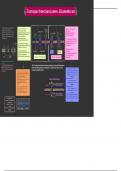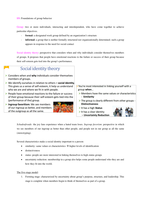Chapter 41: Cognitive and Sensory Impairment
MULTIPLE CHOICE
1. Which is accurate for a young child with a moderate level of cognitive impairment?
a. IQ is within the lower limits of the range
of normal intelligence
b. Is educable
c. Is trainable
d. Is completely dependent on others for
care
ANS: C
The term educable corresponds to mildly impaired persons. The term trainable applies to children with moderate
levels of cognitive impairment. The lower limit of normal intelligence is approximately 70 to 75, and children with
a moderate level of cognitive impairment have an IQ lower than normal levels.
DIF: Cognitive Level: ComprehensionREF: p. 1216
OBJ: Nursing Process: Assessment
2. When should children with cognitive impairment be referred for stimulation and educational
programs?
a. As young as possible
b. As soon as they have the ability to
communicate in some way
c. At age 3 years, when schools are required
to provide services
d. At age 5 or 6 years, when schools are
required to provide services
ANS: A
The child’s education should begin as soon as possible. Considerable evidence exists that early intervention
programs for children with disabilities are valuable for cognitively impaired children. Early intervention may
facilitate the child’s development of
communication skills. Under the Education Act (1956–1996) and the Canadian Human Rights Act (1977),
provinces and territories are required to provide educational opportunities for all children with complex
conditions.
DIF: Cognitive Level: ComprehensionREF: p. 1235
OBJ: Nursing Process: Implementation
, 3. What is the major consideration when selecting toys for a child who is cognitively impaired?
a. Safety
b. Age appropriateness
c. Ability to provide exercise
d. Ability to teach useful skills
ANS: A
Safety is the primary concern in selecting recreational and exercise activities for all children. This is especially true
for children who are cognitively impaired. Age appropriateness, the ability to provide exercise, and the ability to
teach useful skills are all factors to consider in the selection of toys, but safety is of paramount importance.
DIF: Cognitive Level: Analysis REF: p. 1218
OBJ: Nursing Process: Implementation
4. Which is an appropriate intervention to facilitate socialization for a cognitively impaired child?
a. Providing age-appropriate toys and play
activities
b. Providing peer experiences such as Guides
or Scouting when older
c. Avoiding exposure to strangers who may
not understand cognitive development
d. Emphasizing mastery of physical skills
because they are delayed more often
than verbal skills
ANS: B
The acquisition of social skills is a complex task. Children of all ages need peer relationships. Parents should enroll
the child in preschool. When older, they should have peer experiences similar to other children, such as group
outings, Boy Scouts and Girl Guides, and Special Olympics. Providing age-appropriate toys and play activities is
important, but peer interactions will facilitate social development. Parents should expose the child to strangers
so he or she can practice social skills. Verbal skills are delayed more than physical skills.
DIF: Cognitive Level: Comprehension REF: p. 1220 OBJ: Nursing Process: Implementation
5. Which is the most common congenital anomaly seen in children with Down syndrome?
MULTIPLE CHOICE
1. Which is accurate for a young child with a moderate level of cognitive impairment?
a. IQ is within the lower limits of the range
of normal intelligence
b. Is educable
c. Is trainable
d. Is completely dependent on others for
care
ANS: C
The term educable corresponds to mildly impaired persons. The term trainable applies to children with moderate
levels of cognitive impairment. The lower limit of normal intelligence is approximately 70 to 75, and children with
a moderate level of cognitive impairment have an IQ lower than normal levels.
DIF: Cognitive Level: ComprehensionREF: p. 1216
OBJ: Nursing Process: Assessment
2. When should children with cognitive impairment be referred for stimulation and educational
programs?
a. As young as possible
b. As soon as they have the ability to
communicate in some way
c. At age 3 years, when schools are required
to provide services
d. At age 5 or 6 years, when schools are
required to provide services
ANS: A
The child’s education should begin as soon as possible. Considerable evidence exists that early intervention
programs for children with disabilities are valuable for cognitively impaired children. Early intervention may
facilitate the child’s development of
communication skills. Under the Education Act (1956–1996) and the Canadian Human Rights Act (1977),
provinces and territories are required to provide educational opportunities for all children with complex
conditions.
DIF: Cognitive Level: ComprehensionREF: p. 1235
OBJ: Nursing Process: Implementation
, 3. What is the major consideration when selecting toys for a child who is cognitively impaired?
a. Safety
b. Age appropriateness
c. Ability to provide exercise
d. Ability to teach useful skills
ANS: A
Safety is the primary concern in selecting recreational and exercise activities for all children. This is especially true
for children who are cognitively impaired. Age appropriateness, the ability to provide exercise, and the ability to
teach useful skills are all factors to consider in the selection of toys, but safety is of paramount importance.
DIF: Cognitive Level: Analysis REF: p. 1218
OBJ: Nursing Process: Implementation
4. Which is an appropriate intervention to facilitate socialization for a cognitively impaired child?
a. Providing age-appropriate toys and play
activities
b. Providing peer experiences such as Guides
or Scouting when older
c. Avoiding exposure to strangers who may
not understand cognitive development
d. Emphasizing mastery of physical skills
because they are delayed more often
than verbal skills
ANS: B
The acquisition of social skills is a complex task. Children of all ages need peer relationships. Parents should enroll
the child in preschool. When older, they should have peer experiences similar to other children, such as group
outings, Boy Scouts and Girl Guides, and Special Olympics. Providing age-appropriate toys and play activities is
important, but peer interactions will facilitate social development. Parents should expose the child to strangers
so he or she can practice social skills. Verbal skills are delayed more than physical skills.
DIF: Cognitive Level: Comprehension REF: p. 1220 OBJ: Nursing Process: Implementation
5. Which is the most common congenital anomaly seen in children with Down syndrome?





